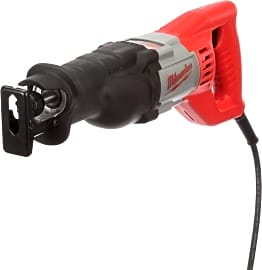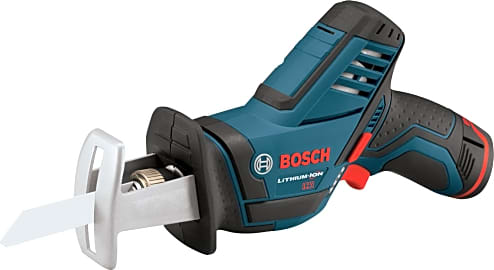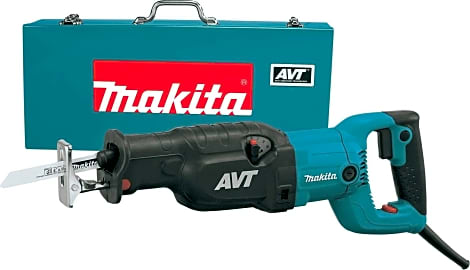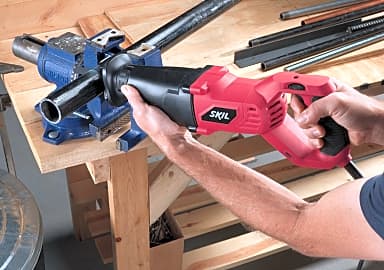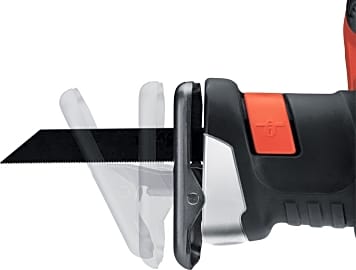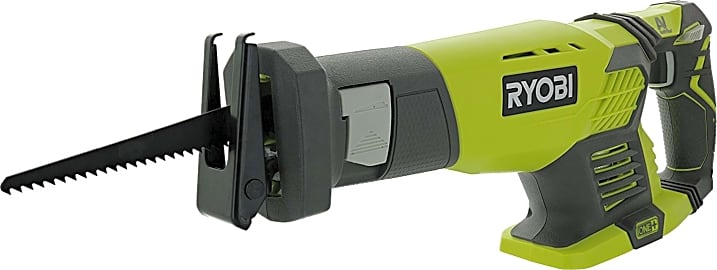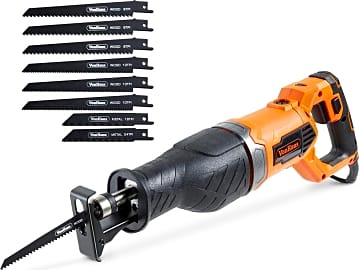The 10 Best Reciprocating Saws

This wiki has been updated 44 times since it was first published in March of 2015. Whether you're a professional tradesperson or simply preparing to take on an ambitious do-it-yourself project, one of these reciprocating saws will come in handy for a variety of different tasks. They're ideal for making holes in drywall, quickly cutting PVC pipe, fitting windows, or hacking through various other materials for demolition jobs. We have options for all skill levels and budgets. When users buy our independently chosen editorial recommendations, we may earn commissions to help fund the Wiki.
Editor's Notes
November 24, 2020:
Adjusted the listing of the Porter Cable PCC670B to reflect that it’s best suited as a tool for casual home jobs, since it probably isn’t powerful enough to take on intense demolition projects, like gutting a kitchen or bathroom for a full remodel. We also noted that some users are disappointed with the power capabilities of the Ryobi P514.
We found that a new version of the Makita JR3050T is now available, though its performance doesn’t seem to be on par with the previous version. We therefore pulled it from the list entirely. We replaced it with a superior model from the same manufacturer — the Makita JR307CT — which runs smoothly, vibrating very little despite its considerable cutting speed. You can order it with or without the extra blades.
We removed the Greenworks Cordless from the Special Honors section, since the tool no longer appears to be part of the company’s portfolio. We added two new models in its place, both of which are relatively low-cost and ideal for home use.
May 30, 2019:
The lone new addition to this list is the Ryobi P514, a lightweight cordless option that costs a fraction of some of the higher end models. Several users swear by it as their go-to tool for chores like cutting tree limbs and trimming overgrown bushes, but it provides enough power and precision for tackling quick do-it-yourself carpentry projects as well. Reports suggest that you may want to purchase blades separately.
We decided to elevate the Skil 9216 in the list, primarily due to its value and simplicity. It’s a corded model, so it delivers plenty of force, and users appreciate its well-balanced body and easy-to-use blade change lever. It’s also suitable for accessing tight spaces, indicated by reports of successful attic jobs.
The Porter Cable PCC670B is certainly a nice option for general handymen and basic work around the house; it runs smoothly, and it has a lot of helpful features. Several users are disappointed with its battery life, however, so we dropped it a bit in the rankings.
Special Honors
Hart HPRS011 An affordable option for relatively light-duty, do-it-yourself remodeling and demo jobs, this tool will quickly slice through most woods, plastics and metals. Its adjustable shoe helps ensure accurate cuts, and it comes with a strong wood blade. The battery and charger are sold separately. harttools.com
Bauer Hypermax Tough aluminum housing encases this durable cordless saw, which features a comfortable, textured handle that absorbs shock so your hand won't become sore or fatigued. The universal battery has a long life and is compatible with other Bauer power tools. harborfreight.com
One Of The Toughest Tools In The Shed
There are reciprocating saw blades designed to be used for cutting metal including copper, steel, and cast iron.
Many tools are purpose built and should be used only for their intended application. This is true with everything from a drill bit designed for use only with tile, as it is for a saw blade custom designed to grind its way through concrete or stone. A trim hammer has no more business being used to break up a patch of asphalt as does a sledgehammer being used to drive finishing nails and brads.
Then there are other tools that can be used for a variety of purposes with good results, provided the person using the tool knows what he or she is doing. A miter saw can be used to cut PVC piping just as readily as it can be used to cut lumber, for example, and a good pair of pliers can be used to loosen screws, tighten bolts, twist pipes, and so much more.
Finally, we come to the reciprocating saw. It's little wonder that this mighty tool is frequently (and affectionately) referred to as the sawzall, for indeed it saws through almost all materials with ease. (For the record, the term Sawzall is actually trademarked by the Milwaukee Electric Tool Corporation.)
A reciprocating saw uses a single slender blade that protrudes from the front of the unit and is pushed and pulled in and out at high speed. When fitted with the right blade type, a "recip saw," as they are often called in certain circles, can cut its way through an impressive range of materials.
There are reciprocating saw blades designed to be used for cutting metal including copper, steel, and cast iron. Others have blades that power through all types of wood. There are also blades that can handle cement board and fiberglass, and then there are multiple purpose blades that are suitable for use cutting many types of material.
Before we talk about the right reciprocating saw for your needs, a few words must be said about safety. It's imperative you always wear thick safety gloves when operating this potentially dangerous power tool, as your hands will be only a few inches away from a sharp, fast moving saw blade. Protective eye wear is also important, as that reciprocating saw can throw up bits of wood, metal, and other debris.
Choosing The Right Reciprocating Saw For Construction
In skilled and steady hands, a reciprocating saw can be used for multiple applications, even for precision work. If you need to cut pipes that must fit tightly together or you need to cut lumber to be used in framing, then make sure to choose a saw with multiple speed control settings. Using a slower cutting speed can help you control your blade as you bear down on the tool. Using a higher speed lets you apply less pressure and focus on holding the tool steadily and safely.
Fortunately, most reciprocating saw blades are quite affordable.
A reciprocating saw is also one of only tools around that can cut a material flush against a flat surface. You can remove a chunk of wood or bar protruding from a wall, for example, by using a longer blade and allowing the blade to bend slightly against the wall as you press it down against the material to be cut away.
Though there are several high quality battery powered reciprocating saws on the market, note that a battery can add lots of extra weight to a tool. For those delicate cutting jobs where precision is key, consider an AC powered option as it might be lighter weight, and consider one of the overall smaller reciprocating saws.
Just keep in mind that the blade you choose for the material you're cutting will often be as (or even more) important than the saw you're using. Fortunately, most reciprocating saw blades are quite affordable. This low price is a good thing, as you should replace your reciprocating saw blades frequently, to avoid accident and maintain efficiency.
Choosing The Right Reciprocating Saw For Demolition
It's when used for demolition that a reciprocating saw truly shines. When fitted with the right blade, a good reciprocating saw can chop right through lumber, nails, wires, and more. Demolition contractors love reciprocating saws precisely for this versatility: there is no need to switch tools when cutting through old framing beams, pipes, drywall, and any other building material that is being removed.
The lighter a tool is, the easier it is to bring it up a ladder or lift safely, and the less operator fatigue it's going to cause.
A robust battery powered reciprocating saw is a fine choice for demo work, as the nature of demolition often means frequent movement around a worksite. On the other hand, a 12 amp AC powered reciprocating saw translates to plenty of power for cutting through thicker, tougher materials. It's for you to decide of which mobility or potency is more important.
Ironically, some of the smallest reciprocating saws can actually be the best choice for demolition work. As a demo job often has to be conducted from the top down, with a house or building that's being leveled first having its roof and rafters removed, for example. The lighter a tool is, the easier it is to bring it up a ladder or lift safely, and the less operator fatigue it's going to cause. Smaller tools are also, of course, easier to fit into tight places, like the cabinet under a sink.
When doing demo work with a reciprocating saw, do keep in mind that while many blades can cut right through many materials, not all reciprocating saw blades are created equal. A blade that was designed for metal can cut through wood, but not as efficiently, for example. A blade designed for wood may well not be able to get through metal, and certainly won't do so without grinding its teeth down well past their useful point.



